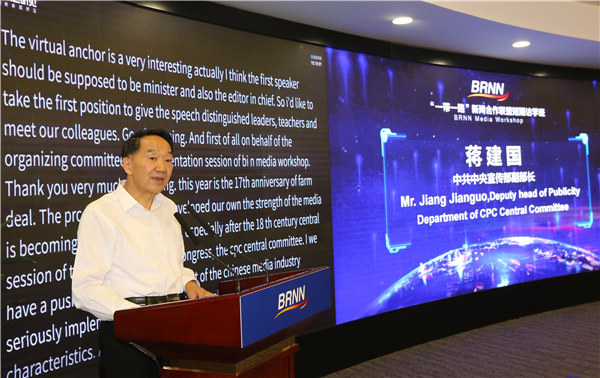


Jiang Jianguo, deputy head of the Publicity Department of the Communist Party of China (CPC) Central Committee, addresses the opening ceremony. (Photo/Liu Long)
A media workshop for Belt and Road News Network (BRNN) journalists opened in Beijing on Sept. 16. The workshop is hosted by the State Council Information Office of China, and was jointly organized by the Secretariat of BRNN (the External Relations Department of People’s Daily) and Communication University of China. Some 50 senior editors and journalists from 46 major media outlets of 26 countries in the Latin American region and Africa attended the opening ceremony.
Jiang Jianguo, deputy head of the Publicity Department of the Communist Party of China (CPC) Central Committee, Tuo Zhen, editor-in-chief of People’s Daily, and Liao Xiangzhong, President of Communication University of China, addressed the opening ceremony.
Jiang noted that since the 18th National Congress of the CPC, Chinese media have earnestly implemented the Xi Jinping Thought on Socialism with Chinese Characteristics for a New Era, while sticking to the standpoint of the people and adhered to their professional ethics of objectivity and authenticity, shouldered social responsibilities, and upholding an open and inclusive perspective.
Media efforts have voiced mainstream ideas, promoted positive energy in society, and stimulated Chinese people’s strong determination to bring the Chinese dream of the great rejuvenation of the Chinese nation into reality, said Jiang.
News media are important carriers for inheriting civilizations and bridges that build understanding and friendship among people around the world, stressed Jiang, adding that to intensify dialogue and exchanges among media outlets of various countries and facilitate mutual learning between media organizations are essential approaches to the realization of joint development and better news services of the global media industry.
This year marks the 70th anniversary of the founding of the People’s Republic of China, said Jiang, noting that he hopes everyone taking part in the media workshop takes the opportunity to carry out in-depth communication, share successful experiences, and promote pragmatic cooperation. He hopes that foreign journalists seize the chance to get to know and understand a warm, friendly, and colorful China.

Tuo Zhen, editor-in-chief of People’s Daily, addresses the opening ceremony. (Photo/Liu Long)
Tuo Zhen said that the first council meeting of the BRNN was successfully held at People’s Daily on April 23 this year. Chinese President Xi Jinping sent a congratulatory letter to the meeting, which provided instructions and guidelines to continue pushing forward with the construction of the BRNN.
A total of 194 media organizations from 94 countries have become official members of the BRNN, said Tuo, pointing out that the media workshop for BRNN journalists is a major project to put into practice the joint declaration of the BRNN and a concrete measure to strengthen communication and cooperation, intensify people-to-people exchanges and mutual learning, as well as jointly promote the production of quality news products on the Belt and Road Initiative (BRI).
Deputy editor-in-chief of People’s Daily, Fang Jiangshan, presented the BRNN media workshop flags to the representatives of the visiting team at the opening ceremony.
Marcelo Cantelmi, director of the international department of Argentine newspaper Clarin, and Makunga Nwabisa, editor-in-chief of South African newspaper The Herald and its sister publication The Weekend Post, spoke at the opening ceremony as representatives of visiting journalists.
The media workshop, which kicked off on Sept. 16 and will run until Sept. 29, is focused on the theme “New Era, New Ideas, New Media, and New Technologies.”

African journalists attending the opening ceremony. (Photo/Liu Long)
During their time in Beijing, the visiting journalists who take part in the media workshop will be provided with lectures, opportunities to visit Chinese media outlets and interact with their peers.
The journalists will also go to Chinese provinces including Shaanxi, Zhejiang, Guizhou, and Guangdong for news reporting and investigation to gain a comprehensive understanding of the significance of BRI in the modern era, truly experiencing China’s achievements, and carrying out in-depth discussions on approaches to and measures for media integration.
 Fire brigade in Shanghai holds group wedding
Fire brigade in Shanghai holds group wedding Tourists enjoy ice sculptures in Datan Town, north China
Tourists enjoy ice sculptures in Datan Town, north China Sunset scenery of Dayan Pagoda in Xi'an
Sunset scenery of Dayan Pagoda in Xi'an Tourists have fun at scenic spot in Nanlong Town, NW China
Tourists have fun at scenic spot in Nanlong Town, NW China Harbin attracts tourists by making best use of ice in winter
Harbin attracts tourists by making best use of ice in winter In pics: FIS Alpine Ski Women's World Cup Slalom
In pics: FIS Alpine Ski Women's World Cup Slalom Black-necked cranes rest at reservoir in Lhunzhub County, Lhasa
Black-necked cranes rest at reservoir in Lhunzhub County, Lhasa China's FAST telescope will be available to foreign scientists in April
China's FAST telescope will be available to foreign scientists in April "She power" plays indispensable role in poverty alleviation
"She power" plays indispensable role in poverty alleviation Top 10 world news events of People's Daily in 2020
Top 10 world news events of People's Daily in 2020 Top 10 China news events of People's Daily in 2020
Top 10 China news events of People's Daily in 2020 Top 10 media buzzwords of 2020
Top 10 media buzzwords of 2020 Year-ender:10 major tourism stories of 2020
Year-ender:10 major tourism stories of 2020 No interference in Venezuelan issues
No interference in Venezuelan issues
 Biz prepares for trade spat
Biz prepares for trade spat
 Broadcasting Continent
Broadcasting Continent Australia wins Chinese CEOs as US loses
Australia wins Chinese CEOs as US loses